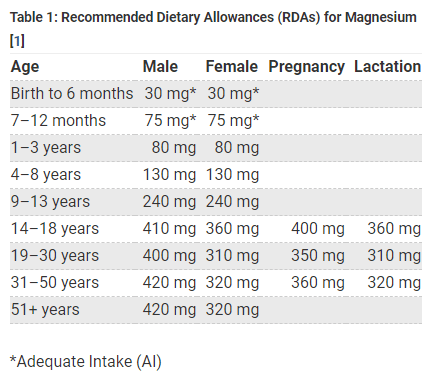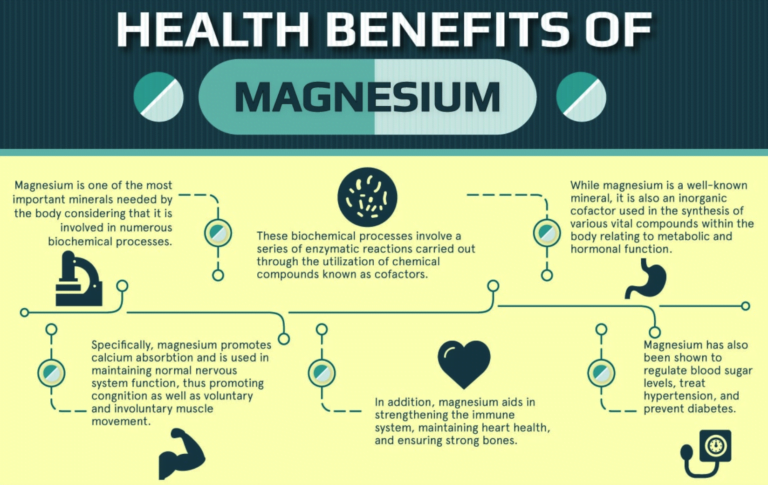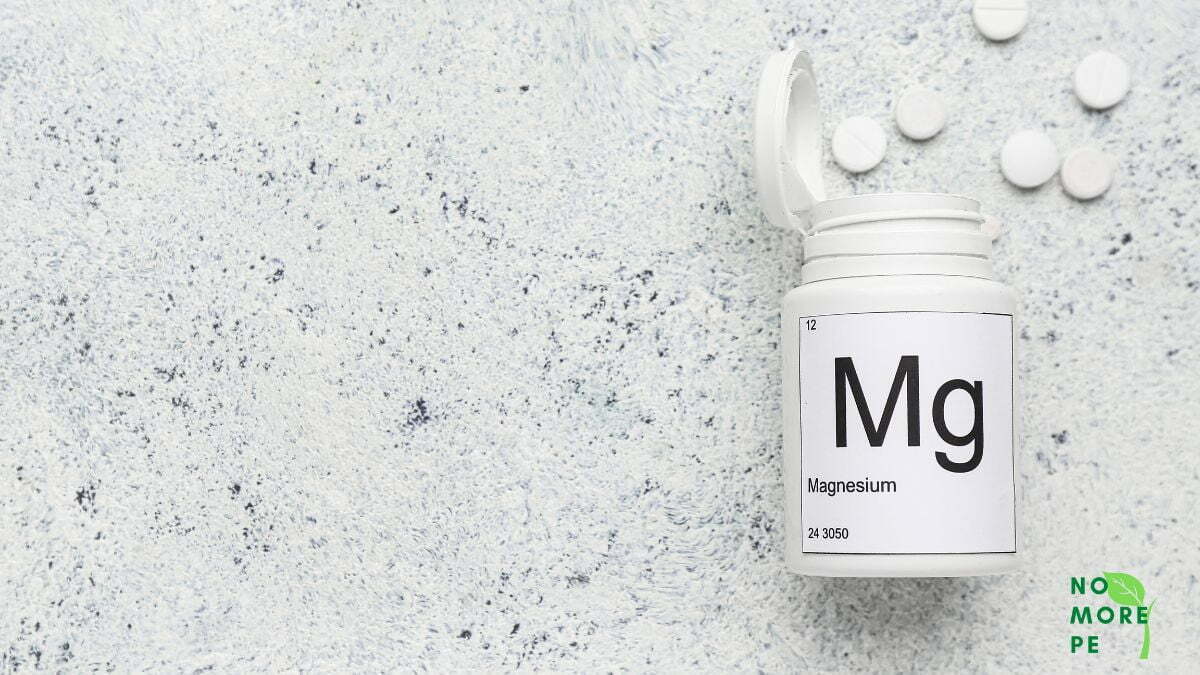Magnesium deficiency causes premature ejaculation (PE). Several studies reported that low levels of magnesium lead to ejaculation problems and make it harder for men to control the ejaculation process and ejaculatory muscles.
How does magnesium impact the ejaculation process and what can you do to last longer in bed using magnesium?
This article covers details about magnesium for premature ejaculation, its impact on ejaculation, scientific studies, and more.
Table of Contents
What is Magnesium?
Magnesium is a chemical element and an essential nutrient for the human body and brain. It has several health benefits as it is needed for several enzyme reactions in our bodies. Lack of magnesium leads to several disorders and this is a reason NIH has recommended a daily value of up to 420 mg of magnesium for adult males and up to 320 mg for adult females.

Magnesium is a natural element that exists in the form of a mineral in the human body. Naturally, it is found in foods. Your body needs magnesium for more than 300 enzyme systems making it an essential mineral for humans.
Magnesium Health Benefit
- Regulates blood sugar: Magnesium plays a crucial role in the management of blood sugar levels and it also helps in the management of diabetes. Research shows that as much as 48% of type 2 diabetes have low levels of magnesium in their blood. A systematic review reported that magnesium supplementation helps improve glucose parameters in diabetic patients. Another review study concluded that people who consume magnesium regularly and fulfill their body’s magnesium needs are less likely to suffer from type 2 diabetes.
- Muscle growth and recovery: Magnesium is an ideal mineral for athletes as it helps them increase muscle mass and improve workout performance. A study reported that cyclists who took 400 mg of magnesium per day for 3 weeks experienced quick muscle recovery and reduction in muscle injury as compared to cyclists who didn’t. None of the participants were magnesium deficient which means an increase in the intake of magnesium reduces muscle injury and boosts muscle recovery. A meta-analysis reported that magnesium supplementation is helpful for muscle fitness for people who have magnesium deficiency.
- Better heart health: Magnesium keeps your health healthy and strong and significantly reduces the risk of cardiovascular diseases. A review study concluded that each 100 mg of magnesium per day reduces stroke risk by 2%. Another review study reported that magnesium supplementation reduces the risk of several heart diseases such as BP issues and good and bad cholesterols.
- Anxiety and depression management: Magnesium helps improve mood and is known to reduce the symptoms of anxiety and depression. A double-blind placebo-controlled clinical trial found that daily consumption of 500 mg magnesium for up to 8 weeks improves depression in magnesium-deficient people. Another study endorsed these findings that taking 248 mg of magnesium reduces anxiety and depression symptoms irrespective of the patient’s magnesium level. A review study reported that magnesium deficiency leads to anxiety and stress.
- Bone health: Magnesium is helpful for bone health as up to 60% of magnesium is stored in bones while the rest is stored in soft tissues. A longitudinal study found that people who have a low intake of magnesium are 3x more likely to have bone issues and fractures than people with a high intake of magnesium. A study linked adequate magnesium intake to higher bone density and low risk of osteoporosis (weakening of bones due to a decrease in bone mass). Another study endorsed these findings by linking low levels of magnesium to a high risk of osteoporosis.
- Migraine: Migraine attacks can be treated with magnesium supplementation. A study reported that one gram of magnesium works better than common medication for migraine attacks and works much more quickly. A review study concluded that magnesium is helpful in the treatment and prevention of migraine headaches. Another systematic review reported that taking 600 mg of magnesium citrate helps prevent migraine attacks.
- Improves sleep: Magnesium helps promote better sleep as it regulates neurotransmitters that are associated with sleep. A study linked magnesium intake with improved sleep quality and duration. A meta-analysis concluded that magnesium supplementation reduced the time it took insomnia patients to fall asleep by 16.06 minutes.
- Low risk of premature ejaculation: Magnesium helps in the treatment of premature ejaculation. A study reported that decreased levels of magnesium lead to issues in the ejaculation process. Another study endorsed these findings by linking low levels of magnesium with premature ejaculation in men.

Magnesium for Premature Ejaculation
Magnesium deficiency in men leads to premature ejaculation. Multiple studies have reported an association between lack of magnesium and ejaculation issues in men.
A 2001 study evaluated the role of magnesium in human semen and how it is linked to premature ejaculation. The authors concluded that a decrease in the level of magnesium leads to premature emission and ejaculation. Men who are suffering from premature ejaculation have low seminal plasma magnesium levels.
A 2005 study endorsed these results by measuring the semen-to-serum magnesium ratio in patients suffering from premature ejaculation. The authors reported that PE has a significant relationship with low levels of magnesium in seminal plasma.
A 2008 study mentioned that inadequate magnesium in the human body is a cause of premature ejaculation. This deficiency, according to the authors, can be best treated with the help of magnesium supplements.
A 2012 study reported that magnesium plays a key role in the relaxation of the male genital tract and penis muscles to delay ejaculation and improve erection. The authors concluded that a decrease in magnesium level in semen is associated with premature ejaculation and higher levels of decrease lead to both PE and erectile dysfunction.
A 2022 study identified the factors that impact ejaculation and reported decreased levels of magnesium in seminal plasma as a cause and factor of premature ejaculation.
Magnesium has an impact on the ejaculation process, premature ejaculation, and erection. Men who have low levels of magnesium are more likely to suffer from premature ejaculation. And men who have an adequate intake of magnesium have more control over the ejaculation process and ejaculatory muscles.
Does Magnesium Make You Last Longer in Bed?
Yes, magnesium makes you last longer in bed.
How?
Magnesium level in your body is linked to premature ejaculation (a sexual disorder where you reach orgasm and eject semen before you want). Low level of magnesium is associated with premature ejaculation and men who suffer from PE have low levels of magnesium in their semen. This is proved scientifically in multiple studies.
If you have magnesium deficiency, you are more likely to ejaculate early and won’t be able to last longer in bed. This is because magnesium is associated with the ejaculation process. It gives you control over your ejaculatory muscles. When you don’t have enough magnesium, you lose control over the ejaculation process and can’t control it.
Poor control over the ejaculation process and ejaculatory muscles mean you will orgasm quickly and without your will.
Conversely, high levels of magnesium make it easy to control ejaculatory muscles and hold back ejaculation.
Magnesium-Rich Foods
The best way to consume magnesium for lasting longer in bed is via food. Here is a list of magnesium-rich foods you must include in your diet:
- 1-ounce pumpkin seeds: 156 mg of magnesium
- 1-ounce chia seeds: 111 mg of magnesium
- 1-ounce almonds: 80 mg of magnesium
- Half cup boiled spinach: 78 mg of magnesium
- 1-ounce dry roasted cashews: 74 mg of magnesium
- Quarter cup peanuts: 63 mg of magnesium
- 2 large biscuits of cereal: 61 mg of magnesium
- 1-cup soymilk: 61 mg of magnesium
- Half cup cooked black beans: 60 mg of magnesium
- Half cup cooked edamame: 50 mg of magnesium
- 2 tablespoons of smooth peanut butter: 49 mg of magnesium
- 3.5 ounces of baked potatoes with skin: 43 mg of magnesium.
You only need a maximum of 420 mg of magnesium per day so most of these foods will provide you enough dose of magnesium for your day.
If you feel you can’t stick with a magnesium-rich diet, consider using an OTC magnesium supplement. These supplements are safe and have no side effects. You can buy a magnesium supplement online without any prescription.
Final Words
Magnesium is an important mineral for the human body. It plays a major role in the ejaculation process and lack of magnesium leads to premature ejaculation.
Men who are diagnosed with PE have low levels of magnesium and increasing the intake of magnesium improves the ejaculation process and helps men last longer.
If you are suffering from PE or want to last longer in bed, you should add magnesium-rich foods to your diet such as pumpkin seeds, chia seeds, almonds, and spinach. Or, start using magnesium supplements to fulfill your body’s needs and last longer in bed.
FAQs
Which mineral is best for premature ejaculation?
Zinc and magnesium are the best minerals for premature ejaculation.
Does zinc or magnesium help with premature ejaculation?
Yes, both zinc and magnesium help with premature ejaculation and make you last longer in bed.
How much magnesium is in ejaculation?
Approximately 17.2 mg/dl (milligrams per deciliter where a deciliter is 1/10 of a liter) of magnesium is found in an average semen sample.
Does magnesium delay ejaculation?
Yes, high levels of magnesium make it easy to delay ejaculation and give you more control over ejaculatory muscles.
Does magnesium increase testosterone?
Yes, magnesium increases testosterone levels in men as reported in a study.
Is it OK to use magnesium every day?
Yes, it is generally safe to take magnesium every day as long as you don’t exceed 420 mg per day.
Does magnesium increase sperm load?
Yes, magnesium increases sperm production by 80% and significantly increases sperm motility.
Which mineral deficiency causes premature ejaculation?
Magnesium deficiency causes premature ejaculation.
Updated: August 24, 2023

